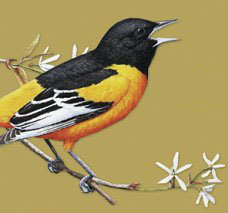Scientists record and play back bird songs to understand how they communicate
 Washington, December 20 : A Cornell researcher has adopted a new way to study exactly how birds communicate-recording their songs and then playing them back to other birds of the same species.
Washington, December 20 : A Cornell researcher has adopted a new way to study exactly how birds communicate-recording their songs and then playing them back to other birds of the same species.
Behavioural ecologist Sandra Vehrencamp records bird songs in Santa Rosa National Park, Guanacaste, Costa Rica.
She says that her aim is to decode which elements of bird songs enable them to communicate about mating and reproduction, territorial boundaries, age, and even overall health.
She has joined forces with experts at the Bioacoustics Research Program at Cornell''s Lab of Ornithology to study birds in such natural habitats as Costa Rica, Colombia and Bonaire.
Sandra and her colleagues record bird songs, and then play them back to birds of the same species to decipher strategies that various species use to attract mates and resolve territorial disputes.
The researchers say that this approach helps them study birds'' reactions to songs when such elements as overlapping vocalization, finer song structural features and the type of song played back are varied.
"You kind of feel like you''re talking to the bird," Sandra said.
So far, the researchers have found that song sparrows in southern California can interpret some forms of playback as "fighting words", as they often resolve conflict by singing the same type of song -- known as song-type matching -- back to one another.
"They get really mad. They treat playback like it''s another bird and will sometimes come right up to the speaker," Sandra said.
According to her, between male birds, if song-type matching fails to resolve a conflict, physical confrontation might ensue.
"They both pay costs if they fight. Birds start to negotiate a boundary dispute with song -- they don''t want to fight," she said
Sandra further said that males that were most successful were those that shared many song types with their territorial neighbours.
According to her, song sparrows could learn songs only within a narrow time period restricted to the first few months after fledging, which means that males must learn neighbourhood songs quickly to facilitate successful territorial negotiations.
"Song sparrows are very restricted learners, so the dominant birds that acquire territories within their natal area share more song types with their neighbours and survive better," said the researcher, who observed that birds with a low degree of song-sharing spend more time fighting with neighbours and are rarely seen the next breeding season. (ANI)